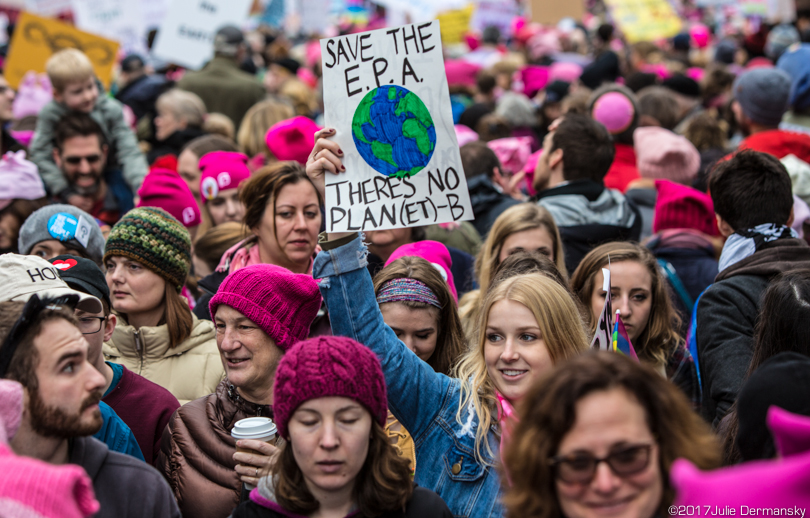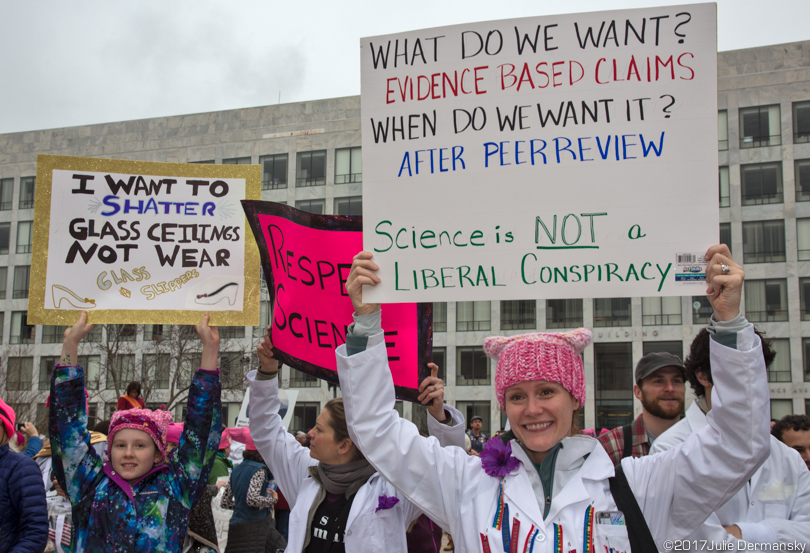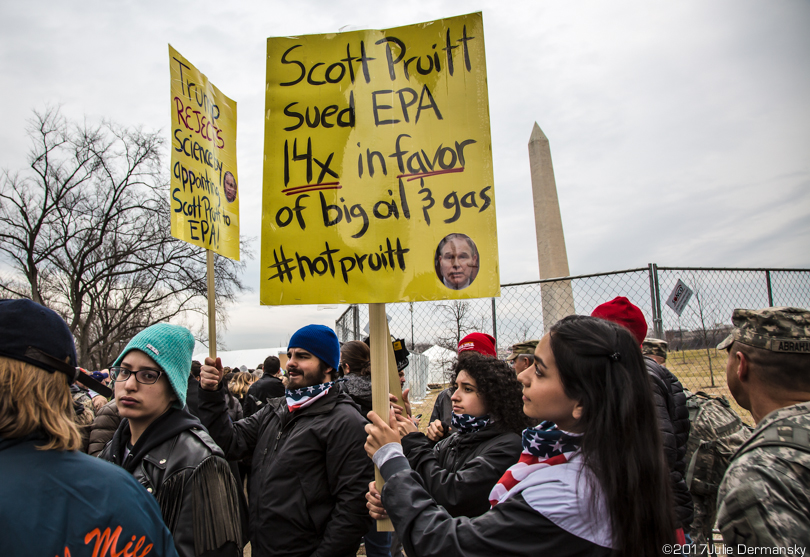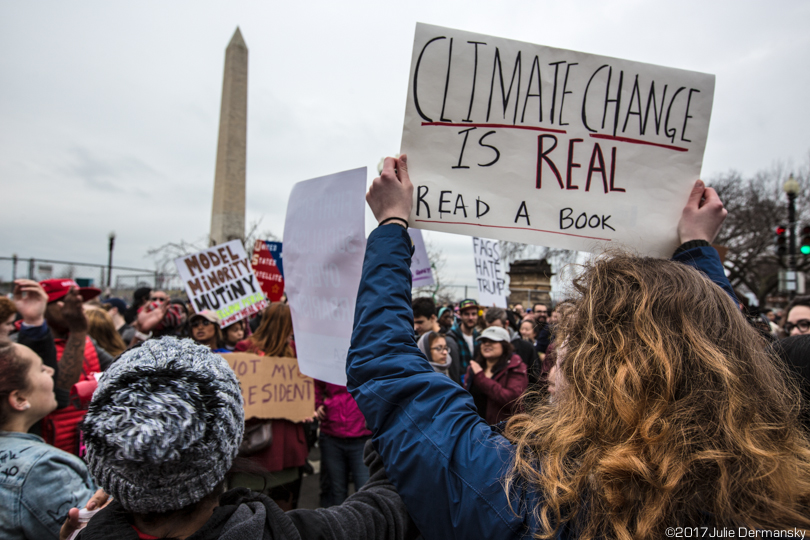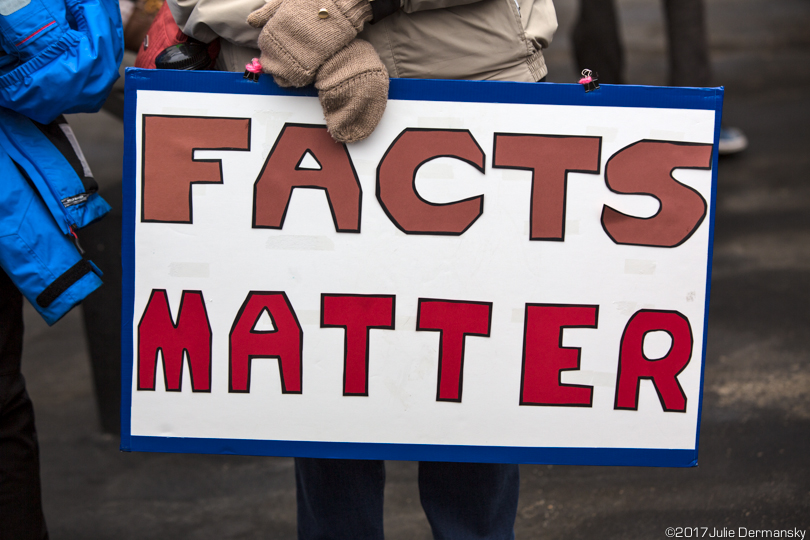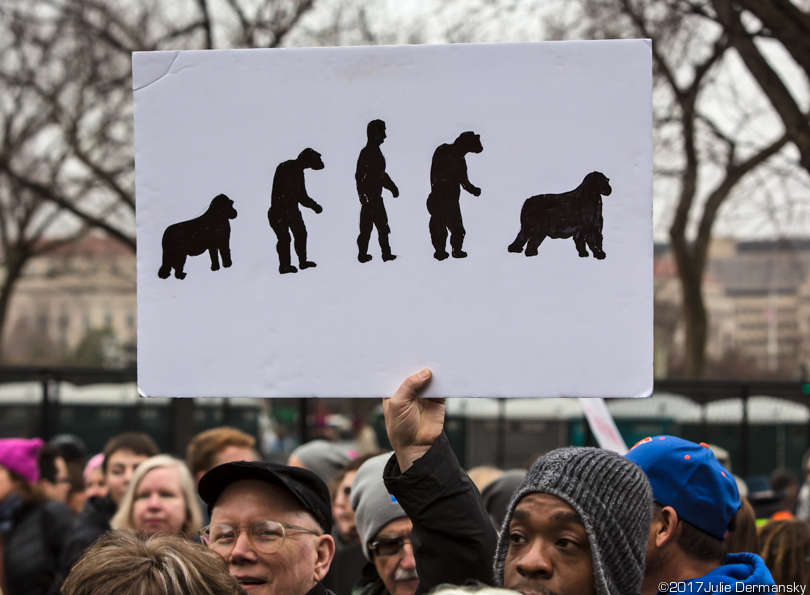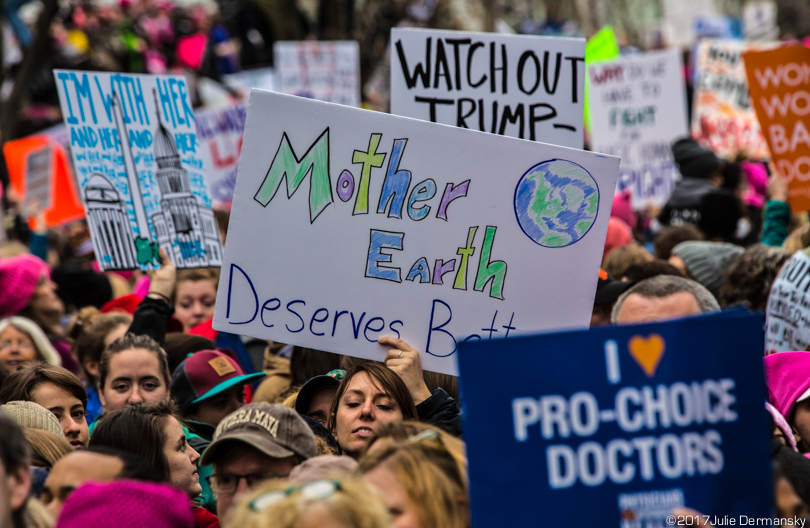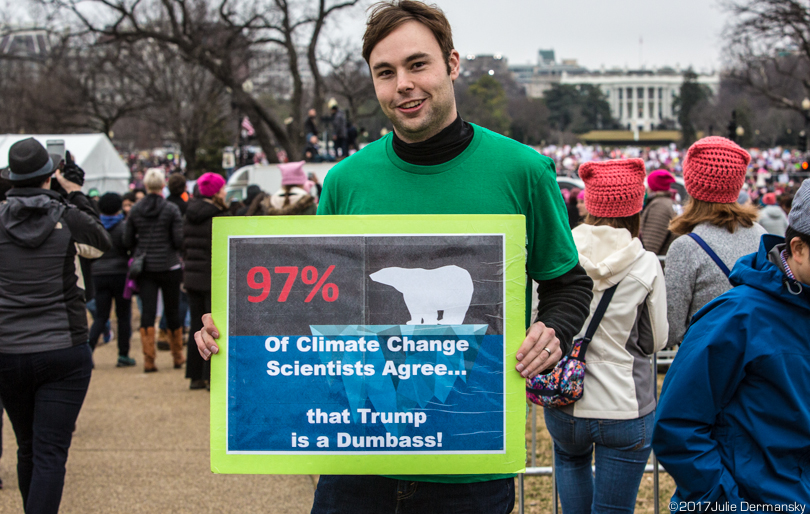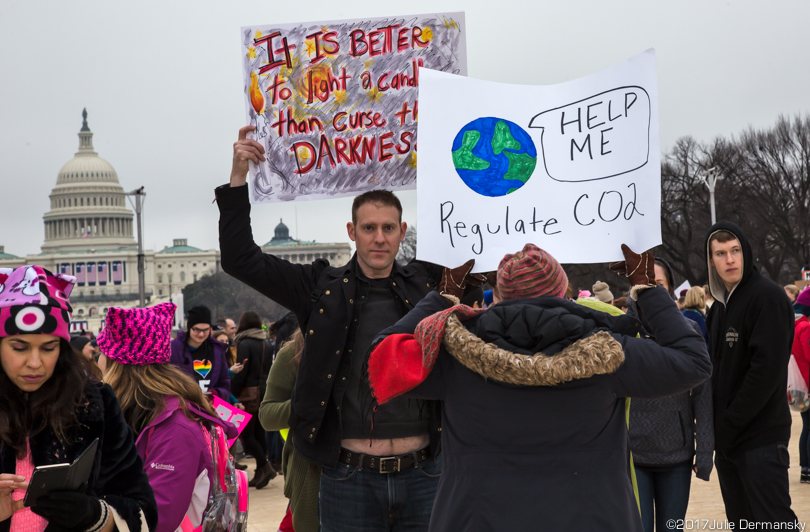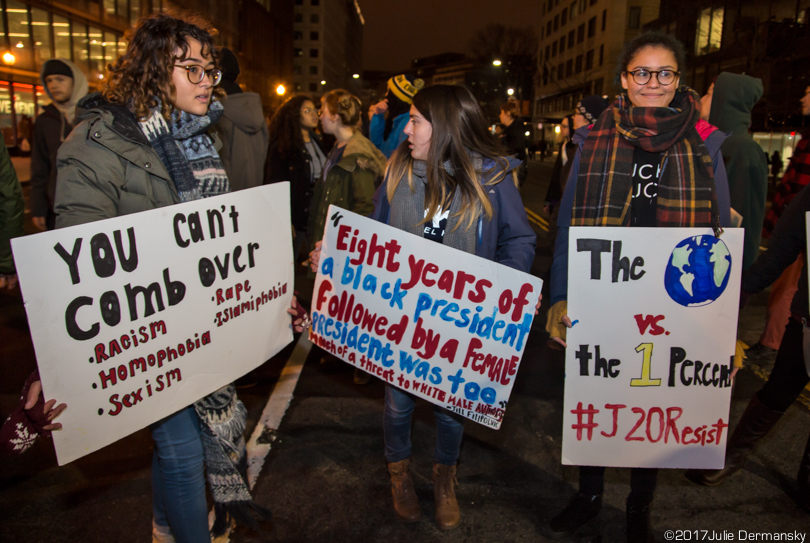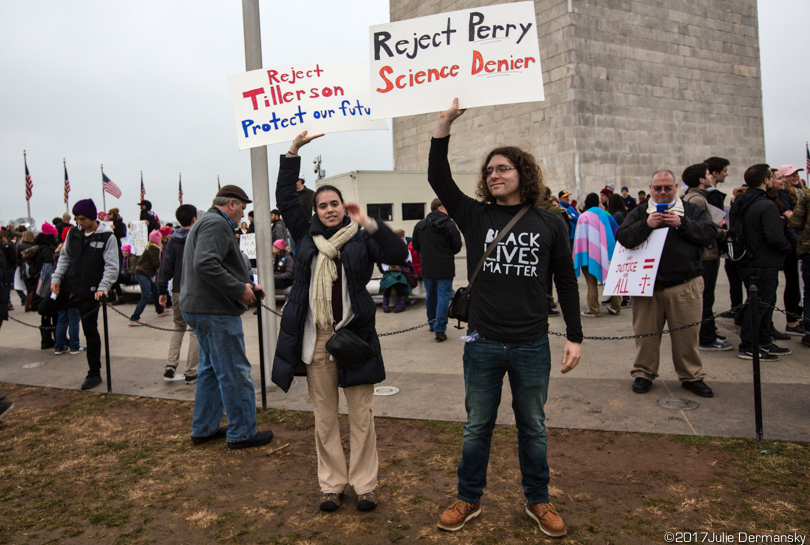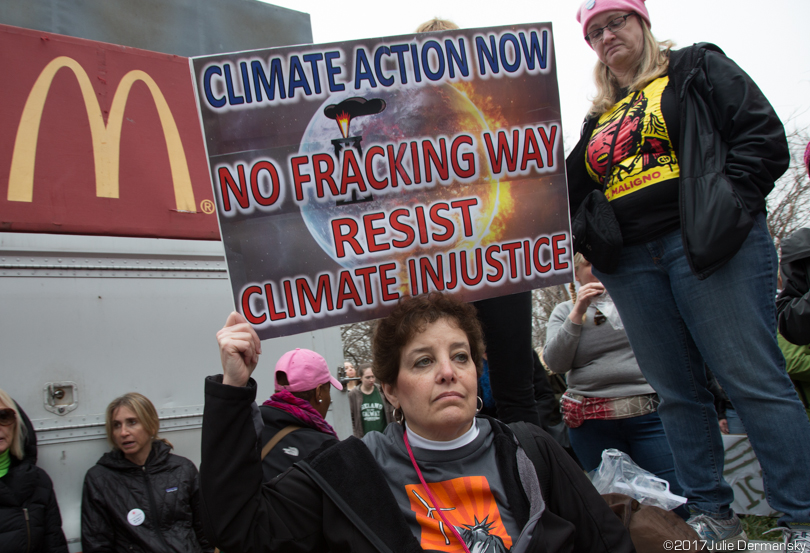The day after Trump’s inauguration, dozens of female scientists decked out in white lab coats met in front of the National Air and Space Museum for the Women’s March in Washington, D.C. They were carrying colorful signs showing support for science.
They are part of 500 Women Scientists, a group that debuted the day after the election to fight anti-science and anti-women rhetoric. Since then, over 12,000 women scientists from around the world have signed on to the group’s open letter.
That pledge warns that “our work as scientists and our values as human beings are under attack. We fear that the scientific progress and momentum in tackling our biggest challenges, including staving off the worst impacts of climate change, will be severely hindered under this next U.S. administration. Our planet cannot afford to lose any time.”
Wendy Bohon, one of the founders of the group 500 Women Scientists, proudly displays her pro-science sign with others at the Women’s March on Washington.
At the march, Wendy Bohon, a seismologist who works in D.C. and one of the group’s founders, carried a sign that said, “What Do We Want? Evidence-based Claims. When Do We Want It? After Peer Review, ” followed by “Science Is Not a Liberal Conspiracy.” Her message is right in line with the group’s mission: to promote evidence-based decision making in science and in politics.
Supporters affiliated with the group 500 Women Scientists pose with their signs in front of the National Air and Space Museum in Washington, D.C.
I asked some of the scientists how they felt about the subject of climate change being removed from the White House website as soon as Trump was sworn in as president.
Planetary scientist Lindy Elkins-Tanton said that while she worries about such things, she was going to wait and see. “I have a great belief that forces for inclusion and positiveness will carry the day, so I’m trying not to make hasty, depressing decisions.”
Christy Till, one of the founders of the group 500 Women Scientists, which marched together in support of science at the Women’s March on Washington.
“My heart sunk,” said Christy Till, an Arizona State University professor of earth and planetary science. Till and the others had worried that Trump’s administration would backtrack on climate science, and news of its removal from the White House website spread fast. “It was a fear that you have coming to reality.”
But Till doesn’t see everything as being completely bleak. “There are a lot of people who work in government who are on our side, and all of that institutional knowledge is a buffer to change, ” she said. “They are not going to roll over.”
“They can’t fire everyone in every department all at once,” she insisted. “You have to have credentials. You have to have experience.”
Climate scientist Dominique Bacheler in front of the Air and Space Museum ahead of the January 21, 2017 Women’s March in D.C.
However, Dominique Bacheler, an Oregon State University scientist who studies the impact of climate change, wasn’t as optimistic. When she found out climate change had been erased from the White House website, she screamed. “It is absolutely unreal,’” she said. “It is one of the things everyone in the whole world is going to have to deal with.”
Protesters express disapproval of Trump’s EPA chief pick, Scott Pruitt, at the entrance to the Washington Monument where people without tickets could watch Trump’s inauguration on a large teleprompter screen.
Protesters hold signs in support of climate science, among other causes, where people exiting Trump’s inauguration came out.
On Trump’s inauguration day, signs expressing concern about the environment were carried at protests around the city staged by DisruptJ20, a coalition of activist groups, as well as at the Women’s March the following day. Their messages ranged from protecting the EPA to dumping Trump’s science-denying cabinet picks.
Signs at the Women’s March on Washington carried messages reinforcing the importance of facts, data, and science to society.
The day after the march, Trump’s senior adviser Kellyanne Conway defended press secretary Sean Spicer, who lied about the crowd size at the inauguration; he was merely offering up “alternative facts,” she said. On the same day, 500 Women Scientists published an open letter to President Trump that stressed the importance of facts.
“We either thrive together or we fail together. American innovation and advancement over the next four years depends on your support,” the letter states, but since science relies on facts, the tentative hope many of the women scientists expressed at the march may be short lived.
A man at the Women’s March on Washington holds a sign indicating backward progress in attitudes toward science and other issues.
One of many signs showing support for the environment and science which were carried by people who participated in the Women’s March on Washington.
Kristopher Holgerson, an aerospace engineer based in Danbury, Connecticut, in front of the White House after the Women’s March on Washington.
Women scientists show an appreciation for data as they gather before the Women’s March in D.C. the day after Trump’s inauguration.
Participants in the Women’s March on Washington congregate with their signs on the National Mall before the march began.
A mural supporting Standing Rock and the fight against the Dakota Access pipeline was created on temporary walls put up in D.C.’s McPherson Square Park.
Gasland director Josh Fox filming an impromptu DisruptJ20 march, which was a movement meant to stymie Trump’s swearing in and related activities, on Inauguration Day.
Participants in a movement called DisruptJ20 take to the streets the night of Trump’s inauguration in an attempt to shut down activities related to it.
An advocate for clean water who was at Standing Rock, known as a “water protector,” talks to riot police after they had dispersed a crowd that was gathered around a fire.
Participants in the DisruptJ20 movement, aimed at shutting down the inauguration and related activities, express their disapproval of several Trump Cabinet picks at the Washington Monument.
Signs at the Women’s March on Washington also displayed anti-fracking, pro-climate action messages.
Young Ben and Cora Ebinger from Minneapolis, Minnesota, play with signs left across from the White House after the Women’s March on Washington.
Main image: One woman’s sign calls to “Save the EPA” during a rally before the Women’s March on Washington the day after Trump’s inauguration.
Subscribe to our newsletter
Stay up to date with DeSmog news and alerts


